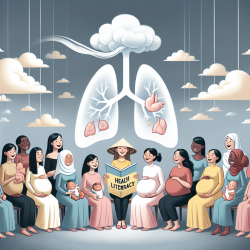The impact of second-hand smoke (SHS) on public health is a significant concern, particularly for vulnerable groups such as pregnant women. A recent study conducted in urban Vietnam sheds light on the inadequate knowledge, attitudes, and practices (KAP) regarding SHS among non-smoking pregnant women. This research highlights the urgent need for health literacy reinforcement to protect maternal and infant health from the dangers of SHS exposure.
Understanding the Research Findings
The study surveyed 432 pregnant women at Bach Mai Hospital in Hanoi to assess their KAP related to SHS. The findings revealed that while there was a moderate level of awareness about SHS's general health risks, there were notable gaps in knowledge about specific diseases linked to SHS exposure. The mean scores for knowledge, attitude, and practice were 4.19, 7.45, and 4.30 out of 10, respectively.
Factors such as age, occupation, living environment, and information sources significantly influenced the KAP scores. For instance, employed women and those who accessed information through magazines had higher knowledge scores. Conversely, rural residents and unemployed individuals demonstrated lower practice scores.
Strategies for Practitioners
Practitioners can play a crucial role in bridging these knowledge gaps and enhancing health literacy among pregnant women. Here are some strategies:
- Targeted Education Programs: Develop educational initiatives tailored to specific groups based on their demographics and information access channels. For example, using internet platforms and community loudspeakers can effectively reach urban populations.
- Empowerment Workshops: Conduct workshops that empower pregnant women to advocate for smoke-free environments at home and in public spaces. These workshops should also educate them about the comprehensive risks associated with SHS.
- Collaborative Efforts: Work with local authorities to enforce stricter regulations on smoking in public places. Encourage community involvement to support these efforts and create a supportive environment for pregnant women.
- Healthcare Provider Training: Train healthcare providers to offer consistent messages about SHS risks during prenatal visits. This can reinforce the importance of avoiding SHS exposure throughout pregnancy.
The Path Forward
The research underscores the need for region-specific interventions that address the unique challenges faced by pregnant women in Vietnam regarding SHS exposure. By implementing targeted education programs and fostering community collaboration, practitioners can significantly improve health outcomes for mothers and their infants.
For those interested in delving deeper into this topic or conducting further research, the original study provides valuable insights into the factors affecting SHS-related KAP among pregnant women. Inadequate Knowledge, Attitude and Practices about Second-Hand Smoke among Non-Smoking Pregnant Women in Urban Vietnam: The Need for Health Literacy Reinforcement










